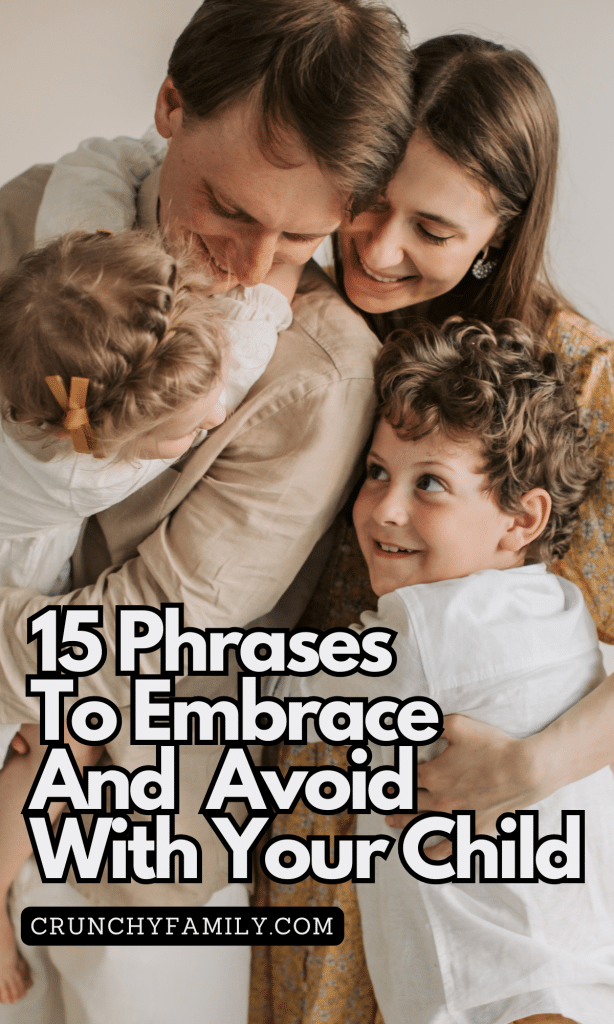If you’re new to the concept, gentle parenting is all about guiding our little ones with empathy, respect, and understanding. It’s about building strong, loving relationships that foster open communication and mutual respect. Let’s explore together how our words can make a world of difference in our children’s lives.
This list is as much an eye-opener for me as it might be for you. We’re all doing our best, navigating the complexities of parenting with love and dedication. Yet, there’s always room for improvement, especially when it comes to the betterment of our children.

I strive daily to be mindful of my emotions and frustrations, making a conscious effort not to project them onto my daughter. It’s a continuous learning process, one that teaches me as much as it teaches her.
Recognizing that you might not have always chosen the gentle parenting path opens up a space for reflection and change. It’s in these moments that we can show our children the strength in vulnerability by apologizing for our mistakes. This not only demonstrates that we are human but also teaches them the invaluable lesson that it’s okay to make mistakes and apologize.
Let’s embrace the lessons of gentle parenting, and foster an environment where both we and our children can grow and thrive.
What to Say
- “I understand how you feel.” Empathy is the cornerstone of gentle parenting. Acknowledging your child’s feelings shows that you value their emotions and experiences. It helps them feel seen and understood.
- “Let’s try to solve this together.” Collaboration teaches problem-solving skills and shows that you’re a team. It encourages your child to think critically and understand that their input is valuable.
- “I love you, no matter what.” Unconditional love provides a secure foundation for your child’s self-esteem and emotional development. It assures them that your love is steadfast, regardless of circumstances.
- “You did a great job!” Specific praise for efforts and achievements boosts confidence and motivation. It’s important to celebrate the process, not just the outcome.
- “It’s okay to make mistakes.” This phrase teaches resilience and the importance of learning from errors. It fosters a growth mindset, where challenges are opportunities to grow.
- “How can I help you?” This question shows your willingness to support them and gives your child a chance to express what they need, fostering independence and self-awareness.
- “I’m proud of you for trying.” Recognizing effort regardless of the outcome encourages perseverance and resilience, teaching them that the process is just as important as the result.
- “Your feelings are important to me.” This validates their emotions and reinforces that their inner world is valued and respected, building emotional intelligence and trust.
- “What do you think about this?” Asking for their opinion shows that you respect their thoughts and decisions, which boosts their confidence and decision-making skills.
- “I’m sorry, I made a mistake.” Admitting your own mistakes demonstrates accountability and shows that it’s okay to be imperfect, encouraging a culture of honesty and forgiveness.
- “I appreciate you doing that.” Expressing gratitude for their actions, no matter how small, fosters a sense of contribution and self-worth.
- “Take your time.” Encouraging patience shows that you respect their learning process and personal pace, which is crucial for developing self-regulation skills.
- “You’re capable of great things.” Instilling belief in their abilities encourages them to pursue their goals and dreams with confidence.
- “It’s okay to change your mind.” This teaches flexibility and the understanding that it’s normal to have evolving opinions and feelings.
- “Let’s talk about what happened.” Promoting open discussion about events or conflicts helps in understanding different perspectives and resolving issues constructively

What Not to Say
- “Because I said so.” This shuts down communication and dismisses the child’s feelings and opinions. Instead, try explaining the reasoning behind your decisions to foster understanding and respect.
- “Stop crying.” This phrase can invalidate their feelings. It’s healthier to encourage them to express their emotions and discuss what’s upsetting them.
- “You’re being too sensitive.” This can make a child feel ashamed of their emotions. Acknowledge their feelings and guide them through understanding and managing these emotions constructively.
- “You always/never do this.” Absolute statements can make a child feel labeled and misunderstood. Focus on the specific behavior and the present situation instead.
- “Let me do it.” Jumping in too quickly can undermine their ability to learn and grow. Offer guidance and support, but allow them the space to try and learn from their own actions.
- “You’re okay, it’s not a big deal.” Minimizing their problems can make them feel misunderstood. Acknowledge their struggles and discuss why they feel a certain way.
- “You should have known better.” This can create feelings of guilt and inadequacy. Instead, focus on learning from the experience and exploring better choices for the future.
- “Don’t be so lazy.” Labeling with negative traits can harm self-esteem. Discuss the importance of responsibility and effort, and how they can approach tasks differently.
- “You’re too young to understand.” This can be dismissive and frustrating. Try to explain things in an age-appropriate way that respects their growing intellect and curiosity.
- “I don’t care what your friend’s parents allow.” This can feel dismissive of their social experiences. Acknowledge their point of view and explain your reasoning, fostering understanding and respect for family values.
- “You’re being dramatic.” This phrase can belittle their feelings and discourage them from expressing themselves. Instead, acknowledge their emotions and discuss what’s causing them to feel so strongly, showing that you take their feelings seriously.
- “You should be more like your sibling/friend.” Comparisons can lead to feelings of inadequacy and jealousy. Celebrate your child’s unique qualities and strengths, emphasizing that everyone is different and that’s what makes them special.
- “I told you so.” This can come across as smug and diminishes the opportunity for a child to learn from their mistakes in a supportive environment. Instead, focus on the lesson to be learned and how to move forward positively.
- “Stop being selfish.” While it’s important to teach empathy and sharing, accusing them of being selfish can hurt their self-esteem. Guide them to understand the impact of their actions on others and encourage empathy without making them feel guilty for their needs and desires.
- “You have nothing to be upset about.” This invalidates their feelings and can make them feel that their emotions are not justified. Acknowledge their right to feel upset and discuss what might be causing these feelings, helping them to understand and manage their emotions effectively.
Gentle parenting is all about nurturing a loving, respectful, and empathetic relationship with our children. The words we choose play a crucial role in this journey. By focusing on positive, supportive language, we can guide our children through the complexities of their emotions and the world around them. Remember, it’s not about being perfect but about being present, understanding, and loving.

2 thoughts on “15 Key Phrases to Embrace and Avoid with Your Child”